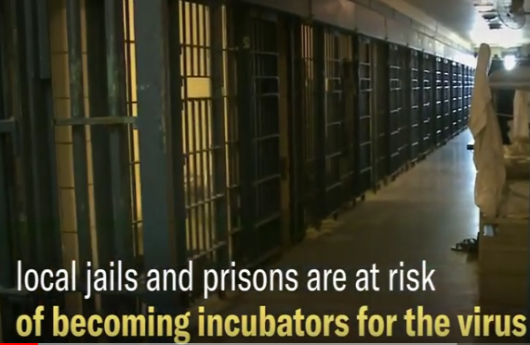[COVID-19\Prisons\Black America]
According to The Marshall Project, there are approximately 9,500 infections among people detained and 3,950 infections among staff in prisons. This is likely an undercount due to lack of information on testing inside prisons.
Photo: YouTube
America’s prisons are obvious dangerous breeding grounds for disaster in the time of COVID-19–like African-American communities that have suffered for generations from racial economic exploitation and oppression.
The Alliance for Safety and Justice released an estimate indicating that close to half of those incarcerated in the U.S. – nearly one million people – have a current chronic illness that could put them at increased risk to COVID-19.
Research by the U.S. Department of Justice and The Pew Charitable Trusts suggests that approximately 40% of the 2.2 million people in jails and prisons have a chronic medical condition. It also shows that 50% of people incarcerated have had a chronic illness, and that does not even account for AIDS/HIV and Hepatitis-C.
The studies show that among older people in prison – those over 50 years old – upwards of 70% have a current chronic illness. Nationally, there are approximately 288,000 people over the age of 50 years old in prison. Public health experts have warned that people with chronic health conditions are especially at risk to COVID-19.
A fact sheet released earlier in the week highlighted new data on the spread of COVID-19 throughout jails and prisons across the country. According to The New York Times, eight of the nation’s top 10 largest Coronavirus outbreaks are in jails or prisons, with two Ohio prisons in the top two spots. The Marshall Project also released data showing that infections in prisons quadrupled last week, after more than doubling each previous week.
“It is essential to the health of communities throughout the U.S. that we safely reduce incarceration in these facilities that have proven to be fuel for the spread of illness,” said Robert Rooks, CEO of Alliance for Safety and Justice (ASJ). “If action is not taken to release people who are at greatest risk, pose no risk to public safety, or can be better served elsewhere, needless deaths will occur inside correctional facilities and their surrounding communities.”
According to The Marshall Project, there are approximately 9,500 infections among people detained and 3,950 infections among staff in prisons. This is likely an undercount due to lack of information on testing inside prisons, and the lack of reporting from many states and the Federal Bureau of Prisons (major outbreaks have already occurred in its facilities). In Ohio’s Marion state prison, which is the nation’s largest outbreak with over 2,100 infections, over 80% of those detained and nearly half of staff have tested positive for COVID-19. The outbreak there has also spread into the surrounding community. Ohio’s Pickaway Correctional Institution is the country’s second-largest outbreak of Coronavirus with over 1,600 positive cases.
Over the past several weeks, crime victims from across the country have expressed support for safely reducing incarceration. Their efforts culminated in a #SurvivorsSpeak virtual event this past weekend, hosted by Crime Survivors for Safety and Justice, where thousands of crime survivors participated in the largest annual gathering of crime victims in the nation.
Alliance for Safety and Justice surveys of crime victims both nationally and in many states have found that a majority of victims prefer shorter prison sentences and instead, more spending on crime prevention to longer prison sentences. Crime survivors consistently express support for prioritizing prevention, rehabilitation and treatment. A growing body of research routinely shows that crime victims do not receive the help they need in the aftermath of an incident, despite steadily increased spending in the criminal justice system.












